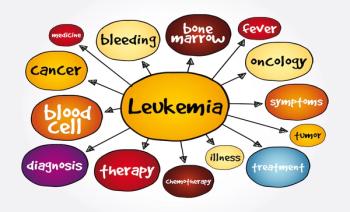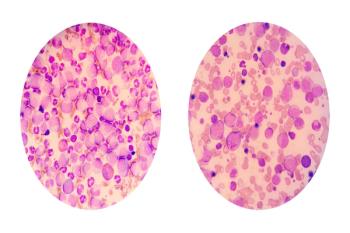
It is rare for patients with chronic lymphocytic leukemia (CLL) to present with ocular involvement, but a mutational test could help clinicians identify patients more quickly.


It is rare for patients with chronic lymphocytic leukemia (CLL) to present with ocular involvement, but a mutational test could help clinicians identify patients more quickly.

Chronic lymphocytic leukemia (CLL) and small lymphocytic lymphoma (SLL) are rare in Japan, but a new report affirms the effectiveness of venetoclax (Venclexta) and rituximab (Rituxan) (VenR) in this population.

Only about 1% of patients with chronic lymphocytic leukemia (CLL) developed an invasive fungal infection while on a Bruton’s tyrosine kinase (BTK) inhibitor, investigators found.

A panel of experts provide an overview of BTK inhibitors for the treatment of patients with chronic lymphocytic leukemia.

Experts on the treatment of chronic lymphocytic leukemia discuss recent trends and innovations in the therapeutic landscape.

In the realm of lymphoma and chronic lymphocytic leukemia (CLL), and of the treatments that address them, a global survey of nearly 7000 patients proves there’s a long way to go to eliminate cancer-related fatigue from their lives.

This study provides a comprehensive review of both established and emerging prognostic markers in chronic lymphocytic leukemia (CLL), and their role in predicting disease, treatment response, and overall survival.

Researchers have found that specific genetic markers may increase the risk of cardiovascular adverse effects in patients using Bruton’s tyrosine kinase (BTK) inhibitors.

A real-world report showed the safety and efficacy of zanubrutinib after a community oncology practice replaced ibrutinib with the newer Bruton tyrosine kinase inhibitor on its formulary.

An abstract presented at the 2024 American Society of Clinical Oncology annual meeting showed that patients treated with zanubrutinib or acalabrutinib had more favorable safety and efficacy outcomes.

The authors said their analysis should help clinicians better monitor patients for potential adverse events.

The new data shed light on long-term outcomes for patients receiving duvelisib, although the investigators said the treatment landscape has also shifted significantly since the original trial.

BET inhibition in chronic lymphocytic leukemia (CLL) significantly reduces leukemic cell burden and restores T-cell function by modulating the immune microenvironment and reversing T-cell exhaustion.

A new report finds secondary immunodeficiency disease (SID) also increases the risk of mortality in patients with B-cell malignancies.

A 77-year-old man had no risk factors for hepatocellular carcinoma (HCC), but he was nonetheless found to have it. Along the way, he was also diagnosed with previously undetected chronic lymphocytic leukemia/small lymphocytic lymphoma (CLL/SLL).

Matching-adjusted indirect comparison methodology was utilized to compare ibrutinib arms across the ALPINE and ELEVATE-RR trials.

Due to the rarity of primary breast lymphoma, individualized treatment plans that consider overall health, symptoms, and patient preferences should be curated.

The case of a 77-year-old woman with a long chronic lymphocytic leukemia (CLL) history illustrates the novel use of zanubrutinib as a potential option for some patients who have failed first-generation Bruton tyrosine kinase (BTK) inhibitors and venetoclax.

A very unusual case of 2 chronic leukemias, chronic lymphocytic leukemia (CLL) and secondary chronic myeloid leukemia (CML) existing simultaneously in an older patient was treated with a pair of targeted kinase inhibitors.

There was a marked increase in the prevalence of targeted therapy among patients with chronic lymphocytic leukemia (CLL), which corresponded to positive overall survival rates observed in the study.

An overview of the treatments for chronic lymphocytic leukemia (CLL) and novel therapies on the horizon, including double and triple combination therapies, cellular therapies, and bispecific antibodies.

UGT2B17, a metabolic enzyme known for regulating various endogenous molecules, has been identified to have heightened expression in the B cells of patients who have chronic lymphocytic leukemia (CLL).

EVIdeNCE study data, from real-world practice, confirm the efficacy and safety that ibrutinib previously demonstrated in clinical trials involving patients with CLL, according to the study authors.

Researchers conducted an analysis of 4 phase 3 trials, covering 2751 patients, to address the potential for targeted agents in younger and physically fit patients who have chronic lymphocytic leukemia (CLL).

Investigators said both reflexology and acupressure led to similar improvement in patients after 4 weeks.

259 Prospect Plains Rd, Bldg H
Cranbury, NJ 08512
© 2025 MJH Life Sciences®
All rights reserved.
